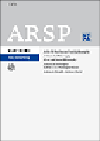
Archiv fur Rechts- und Sozialphilosophie
Scope & Guideline
Advancing insights into the complexities of justice and society.
Introduction
Aims and Scopes
- Legal Philosophy and Theory:
The journal critically examines foundational concepts in legal philosophy, exploring theories of law, justice, and the role of legal norms in society. - Social Philosophy and Ethics:
It delves into social philosophical inquiries, addressing ethical questions in the context of law, human rights, and social justice. - Critical Theory and Legal Criticism:
A consistent focus on critical legal studies, the journal encourages discussions on the limitations and implications of existing legal frameworks, including critiques of legal positivism and natural law. - Interdisciplinary Approaches:
The journal promotes interdisciplinary research that bridges law with other fields such as sociology, political science, and cultural studies, fostering diverse perspectives on legal and social issues. - Historical Contextualization:
It emphasizes the historical dimensions of legal and social thought, tracing the evolution of ideas and their implications for contemporary legal practices. - Emerging Technologies and Law:
The journal explores the impact of technological advancements, including artificial intelligence, on legal principles and social structures, reflecting on the challenges posed by digitalization.
Trending and Emerging
- Human Rights and Justice:
There is a growing emphasis on human rights discourse, particularly in the context of global crises such as migration, pandemics, and social inequality, showcasing the relevance of legal philosophy in advocating for justice. - Intersections of Law and Technology:
The exploration of how emerging technologies, especially artificial intelligence, interact with legal principles and social norms is increasingly prominent, addressing the ethical implications of technological advancement. - Crisis of Democracy and Governance:
Recent publications focus on the challenges facing democratic institutions and governance, reflecting on the philosophical underpinnings of political legitimacy and authority in contemporary society. - Cultural and Historical Perspectives on Law:
An emerging trend is the integration of cultural and historical analyses into legal discourse, examining how cultural narratives and historical contexts shape legal understanding and practice. - Ethics in Legal Practice:
A notable increase in discussions surrounding the ethical dimensions of legal practice, including issues of responsibility, accountability, and the moral obligations of legal professionals.
Declining or Waning
- Traditional Natural Law Theories:
The focus on classical natural law theories has lessened, as contemporary discussions increasingly prioritize critical, pragmatic, and pluralistic approaches to law. - Pure Legal Positivism:
There is a noticeable decline in articles solely advocating for pure legal positivism, as scholars seek to integrate more complex, multifaceted perspectives on law and morality. - Historical Legal Doctrines:
While historical analysis remains important, there is a reduced emphasis on specific historical legal doctrines, with a shift towards contemporary applications and critiques. - Solely Descriptive Legal Studies:
The journal has seen a decrease in purely descriptive studies of legal systems, favoring instead normative critiques and analyses that engage with ethical and philosophical dimensions. - Legal Formalism:
The interest in legal formalism has waned as scholars increasingly challenge rigid interpretations of law, advocating for more dynamic and context-sensitive legal frameworks.
Similar Journals

LAW AND CRITIQUE
Elevating Legal Discourse with Critical InsightsLaw and Critique is a prestigious academic journal published by Springer, prominently focused on the field of Law. With an ISSN of 0957-8536 and E-ISSN of 1572-8617, this journal has established itself as a vital resource for legal scholars and practitioners since its inception in 1990. Currently based in the Netherlands at Van Godewijckstraat 30, 3311 GZ Dordrecht, it aims to foster critical engagement with legal theory and practice by publishing innovative research that challenges traditional legal paradigms. With an impressive categorization of Q2 in Law for 2023 and a Scopus rank placing it in the 79th percentile of social sciences, Law and Critique serves as an essential platform for the dissemination of rigorous academic inquiry and interdisciplinary dialogue. Although it does not offer Open Access, the journal continues to attract a diverse readership who seek to push the boundaries of legal thought and to influence contemporary legal debates.

Vestnik of Saint Petersburg University-Law-Vestnik Sankt-Peterburgskogo Universiteta-Pravo
Navigating the Nuances of Law in a Changing WorldVestnik of Saint Petersburg University-Law, published by St Petersburg University Press, is a vital academic resource in the field of law, particularly significant within the Russian legal landscape. With an ISSN of 2074-1243 and an E-ISSN of 2587-5833, this journal serves as a platform for rigorous research, critical analysis, and scholarly discourse, contributing to the advancement of legal knowledge and practice. Although currently classified in the Q4 quartile for the year 2023 by Scopus rankings, it holds a unique position within the academic community, catering to a diverse audience of researchers, legal professionals, and students, especially those interested in the evolving nuances of law in Russia. You can explore comprehensive studies and articles that reflect the contemporary challenges and developments in law, while benefiting from the journal's focus on fostering a deep understanding of legal principles. The journal runs from 2019 to 2024, encapsulating emerging trends and insights in law that are critical for continuous learning and growth in this discipline.

Doxa-Cuadernos de Filosofia y Derecho
Exploring the Nexus of Thought and JusticeDoxa-Cuadernos de Filosofia y Derecho, an esteemed journal published by Universidad de Alicante, serves as a vital platform for scholarly discourse in the fields of philosophy and law. Established with the intention of fostering an interdisciplinary understanding, the journal is indexed with an impressive Q1 ranking in Philosophy and a Q2 ranking in Law for 2023. With its Open Access policy implemented since 2016, Doxa ensures that cutting-edge research is freely accessible, promoting wider dissemination of ideas and encouraging academic collaboration. Housed in the picturesque city of Alicante, Spain, Doxa celebrates a converged publishing timeline from 2019 to 2023, reflecting its commitment to contemporary issues and dialogues within both disciplines. As a vital resource for researchers, professionals, and students, this journal invites contributions that push the boundaries of philosophical inquiry and legal scholarship.

Cuadernos Electronicos de Filosofia del Derecho
Uniting Theory and Practice in Legal PhilosophyCuadernos Electronicos de Filosofia del Derecho, published by Universitat de València, Servicio Publicaciones, is a pioneering open access journal that has been advancing the discourse in legal philosophy since its inception in 1998. With its ISSN 1138-9877, this journal serves as a critical platform for scholars and practitioners interested in the intersection of law and philosophy. The journal operates from Valencia, Spain, and has notably achieved a Q3 quartile ranking in Philosophy and a Q4 ranking in Law as of 2023, reflecting its growing influence in these distinct yet interconnected fields. With an HIndex that illustrates its commitment to rigorous scholarly work, Cuadernos Electronicos de Filosofia del Derecho invites contributions that explore foundational issues, theoretical frameworks, and contemporary challenges in legal thought, making it an essential resource for researchers, professionals, and students alike. As it converges topics through to 2024, the journal embraces a multidisciplinary approach and seeks to foster collaborations and discussions that will shape the future of legal philosophy.
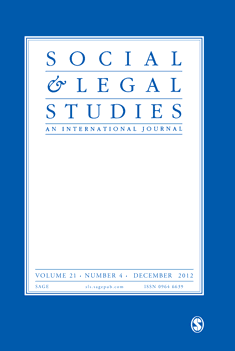
SOCIAL & LEGAL STUDIES
Shaping the Future of Legal and Social ResearchSOCIAL & LEGAL STUDIES, published by SAGE Publications Ltd, stands at the forefront of interdisciplinary research within the spheres of law, sociology, and political science. With an ISSN of 0964-6639 and an E-ISSN of 1461-7390, the journal has established a significant presence in academia since its inception in 1992. This esteemed journal, recognized as a Q1 publication in Law and holding Q2 status in both miscellaneous Social Sciences and Sociology & Political Science categories, garners attention from leading scholars and practitioners alike, evidenced by its impressive Scopus rankings, including a top 88th percentile in Law. Although it does not offer open access, researchers and students can rely on this journal for high-quality, peer-reviewed articles that synthesize theoretical and empirical insights, addressing contemporary legal and social issues. As it converges into 2024, SOCIAL & LEGAL STUDIES continues to be a vital platform for advancing discussions that shape the interplay between societal norms and legal frameworks.

Rivista di Filosofia del Diritto-Journal of Legal Philosophy
Exploring the Intersection of Law and PhilosophyThe Rivista di Filosofia del Diritto - Journal of Legal Philosophy is a prestigious scholarly publication dedicated to the interdisciplinary exploration of legal philosophy, offering a platform for rigorous academic discourse in both law and philosophy. Published by SOC ED IL MULINO in Italy, this journal plays a vital role in advancing theoretical insights and critical analyses that bridge the gap between legal practices and philosophical thought. With an ISSN of 2280-482X, the journal currently holds a commendable status in the 2023 category quartiles, ranked Q3 in Law and Q2 in Philosophy, reflecting its growing influence in both fields. The Rivista di Filosofia del Diritto ranks 322nd out of 806 in Arts and Humanities for Philosophy and 648th out of 1025 in Social Sciences for Law, highlighting its commitment to quality research in an increasingly competitive academic landscape. Although not open access, the journal made significant strides since its inception in 2016, converging towards its 2024 goals aimed at fostering a deeper understanding of legal concepts through a philosophical lens. Researchers, professionals, and students alike will find this journal an invaluable resource for scholarly materials that challenge the norms and expand the horizons of legal philosophy.
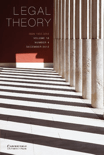
Legal Theory
Bridging Legal Norms with Philosophical InquiryLegal Theory, published by Cambridge University Press, stands as a significant academic journal dedicated to the exploration of the conceptual foundations and implications of law within the wider realm of philosophy. Established in 1995 and maintaining a consistent publication record through 2023, the journal has garnered a reputation for its high-quality scholarly contributions, reflected in its impressive rankings: Q2 in Law and Q1 in Philosophy as of 2023. With an impactful presence in the Scopus Ranks, Legal Theory is positioned 158th in Philosophy and 337th in Law, highlighting its relevance and influence—especially within the arts and humanities. This journal serves as a critical platform for researchers, professionals, and students who seek to engage with the intricate interplay between legal norms and philosophical inquiries. Though not open access, it offers a wealth of knowledge that is integral to advancing discourse in legal philosophy, making it an essential resource for those looking to deepen their understanding of contemporary legal theories and their implications.
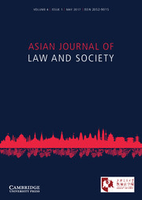
Asian Journal of Law and Society
Exploring the Intersections of Law and Social DynamicsAsian Journal of Law and Society, published by Cambridge University Press, serves as a vital platform for scholarly discourse in the fields of law and social sciences. With an impressive 2023 impact factor placing it in the Q2 quartile in both law and sociology/political science categories, this journal is influential in shaping contemporary legal and sociological thought. Covering a broad range of topics, from legal frameworks in Asian contexts to the interplay between law and societal dynamics, the journal invites researchers, practitioners, and students to contribute original articles, critiques, and interdisciplinary analyses. Although it does not currently offer open access options, the Asian Journal of Law and Society continues to be recognized for its significant contributions, as reflected in its Scopus rankings, where it is positioned in the top 30% of law journals and around the 44% ranking in sociology and political science. This trajectory highlights its importance for anyone interested in understanding the complex legal landscapes and social structures across Asia.
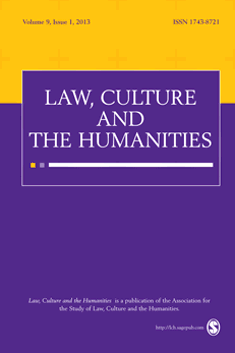
Law Culture and the Humanities
Cultivating Critical Perspectives on Law and CultureLaw Culture and the Humanities, published by SAGE Publications Ltd, serves as a pivotal forum for interdisciplinary dialogue at the intersection of law and the humanities. With an ISSN of 1743-8721 and an E-ISSN of 1743-9752, this esteemed journal has been contributing to scholarly discourse since its inception in 2005 and continues to do so until 2024. The journal carries a respectable impact factor showcased through its category rankings: Q3 in Arts and Humanities (miscellaneous), Q2 in Cultural Studies, and Q3 in Law. Its Scopus rankings reflect an impressive standing in the social sciences, particularly within Cultural Studies and Law, indicating that it is a fundamental resource for researchers and professionals aiming to explore the nuanced relationships between legal frameworks and cultural expressions. While not an Open Access journal, it offers substantial insights into contemporary debates, making it essential for academics and students engaged in the study of law's cultural dimensions.

Materiali per una Storia della Cultura Giuridica
Illuminating the Past, Shaping Future Legal InsightsMateriali per una Storia della Cultura Giuridica is a prominent academic journal that delves into the historical and cultural facets of legal systems and practices. Published by SOC ED IL MULINO in Italy, this journal stands as a critical resource for scholars in the field of law as well as sociology and political science. With an ISSN of 1120-9607, it is dedicated to fostering a deeper understanding of legal culture through robust research and scholarly discourse. Though categorized in Q4 for both Law and Sociology and Political Science as of 2023, the journal serves as an essential platform for emerging voices and innovative perspectives in its converge years from 2015 to 2024. While currently lacking open access options, it is invaluable for researchers striving to explore the intricate relationships between culture and law. With its insightful articles and comprehensive analyses, Materiali per una Storia della Cultura Giuridica plays a significant role in the academic landscape, making it a must-read for students, professionals, and researchers alike on their quest for knowledge in legal history and cultural studies.